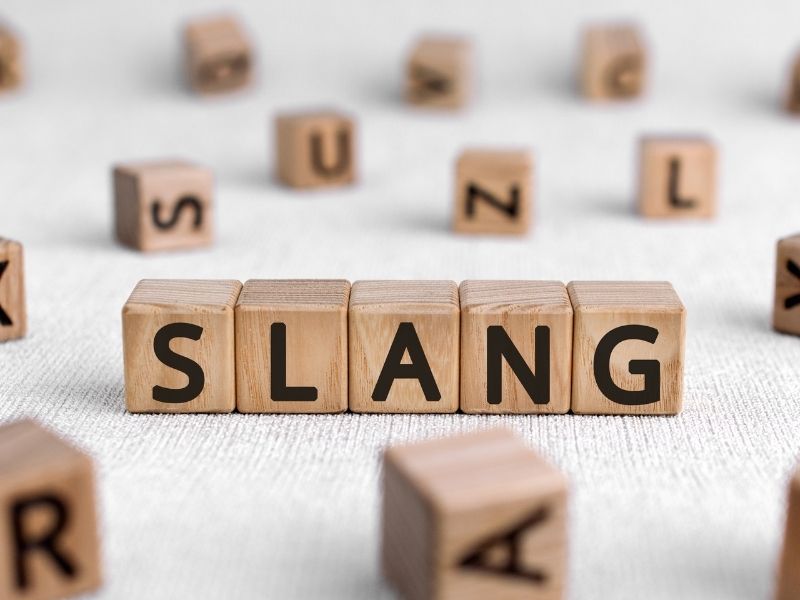Places like social media, comment sections, and online forums use English that might seem completely new to you.
That’s because talking on the internet can be very different from talking in person or even in emails. Online English is casual & personal and uses a lot of slang.
So to help you keep up, we have made a list of 12 English slang terms you might see online. With the help of these slangs you would be able to know more about how things are discussed, secondly, it will help you make your conversations smaller but bigger in value.
Contents
12 English Slangs That You Need To Know
Let us have a look at 12 different English slangs that you can learn and use after reading this blog till the end.
1- WYA:
The first slang from the list is WYA, which means “Where You At” this is an acronym that is being mostly used by teenagers nowadays with the help of which they are able to ask others where they are.
In case you have the question in your mind, what does WYA mean? Then it is a way to ask other people about where they are in a way that we are asking this question in front of their faces.
Most people don’t have any idea about why we are using acronyms or slang nowadays, but the real reason behind it is, that people relate to these things nowadays and it makes the overall communication extremely easy and in a flow.
2- Hashtag:
Many websites and blogs use tags to make it easier to search for content. When Twitter first came out, it didn’t have the option to add these tags. People who used Twitter decided to create their own way of tagging their posts: the hashtag.
Hashtags use the # symbol before the keywords, which are written without spaces. The hashtag has expanded into the rest of the Internet and doesn’t only exist on Twitter now.
One example of a popular hashtag is #TBT, which stands for Throwback Thursday. People share old things from their childhoods (remember phone cords and dial-up modems?) and use that hashtag. #TBT is used on other social media websites as well, even on days other than Thursday.
3- DM (Direct Message):
A direct message, or DM, is a term used on Twitter for private communication with someone. Each user has a “Messages” page where they can read and send direct messages to other users.
4- AMA (Ask Me Anything):
The AMA was first made popular on the sharing forum and community, Reddit. Short for “Ask Me Anything,” an AMA is when someone, usually well-known or from an interesting background, goes online and answers questions posed by the community.
5- Troll:
Online, trolls are people who take pleasure in starting disagreements and angering people. Trolls usually post or respond to comments in a way that will annoy or anger the most people possible.
There’s a saying online, “Don’t feed the trolls.” This means you shouldn’t interact with someone who is “trolling,” since it will only encourage them.
You usually find trolls hanging out on forums, but they can be anywhere online, from your Facebook, to the comments section on a news article.
6- Meme:
The word “meme” has been around longer than the Internet. Outside the Internet, the word describes a part of the culture that developed because it was passed on from one person to another, usually by imitation. A meme can be an idea, a tune, an image—anything that can be passed on and altered.
Online, though, a meme is an image, text, or video that’s copied and modified over and over again. Most of the time, people add their own funny changes to the image or text.
You’ve probably already seen a few memes, like Grumpy Cat or Confession Bear.
7- Epic Fail:
When someone fails, usually due to an easily avoided mistake, people online call it an “epic fail.” The word “epic” actually refers to old poems and stories that described the long and awesome adventures of legendary heroes.
Today we use the word “epic” to talk about anything huge or important, like that epic sandwich we ate last night.
8- I Can’t Even:
This is another way of saying “I’m speechless.” This phrase is used when something is so incredible or unbelievable that you have no words to respond with.
Grammatically, this is not a complete sentence or thought, but on the Internet, it’s used as one. Sometimes this phrase is paired with the word “literally,” as in, “Literally, I can’t even” or “Literally, I can’t.”
9- FAQ (Frequently Asked Questions):
Many websites have an FAQ section. It’s a place where they answer frequently asked questions or questions that are asked a lot.
The term “FAQ” is not used often in conversations, but it’s good to know for navigating websites.
10- Lag:
Even if you’re lucky enough to have a steady Internet connection or a great computer, you’ve probably experienced lag. Lag is when a computer application is slow to respond, or any other device slows down because of a poor connection or old hardware (computer parts).
The term is often used when videos or online games are too slow/choppy to show what’s happening in real-time.
The word “lag” is also used outside of the Internet, to mean the same thing: to fall behind, or to go slower than everyone else.
11- TBH (To Be Honest):
The phrase “to be honest” can be used on or offline in the same way. It’s a filler phrase, meaning it doesn’t really add anything to the sentence you’re about to say.
But many people use it when they feel like what they’re about to say is extra honest, something they really believe, or something they’ve thought about thoroughly before saying.
12- OTL:
This is a fun one simply because it took me forever to understand what this was short for. Actually, it’s not an abbreviation at all— it’s an emoji (an icon used to show an expression or feeling).
It’s a man kneeling on the floor and is used to show disappointment or desperation. His head is the “O” on the left, his arms are the stem of the “T,” with his back on top, and the “L” is his kneeling legs.
Conclusion:
You also think that you are behind today’s generation in communication? If yes, then slangs and acronyms are the things that can help you move ahead of them. Here we have discussed 12 different slangs that you can learn an




